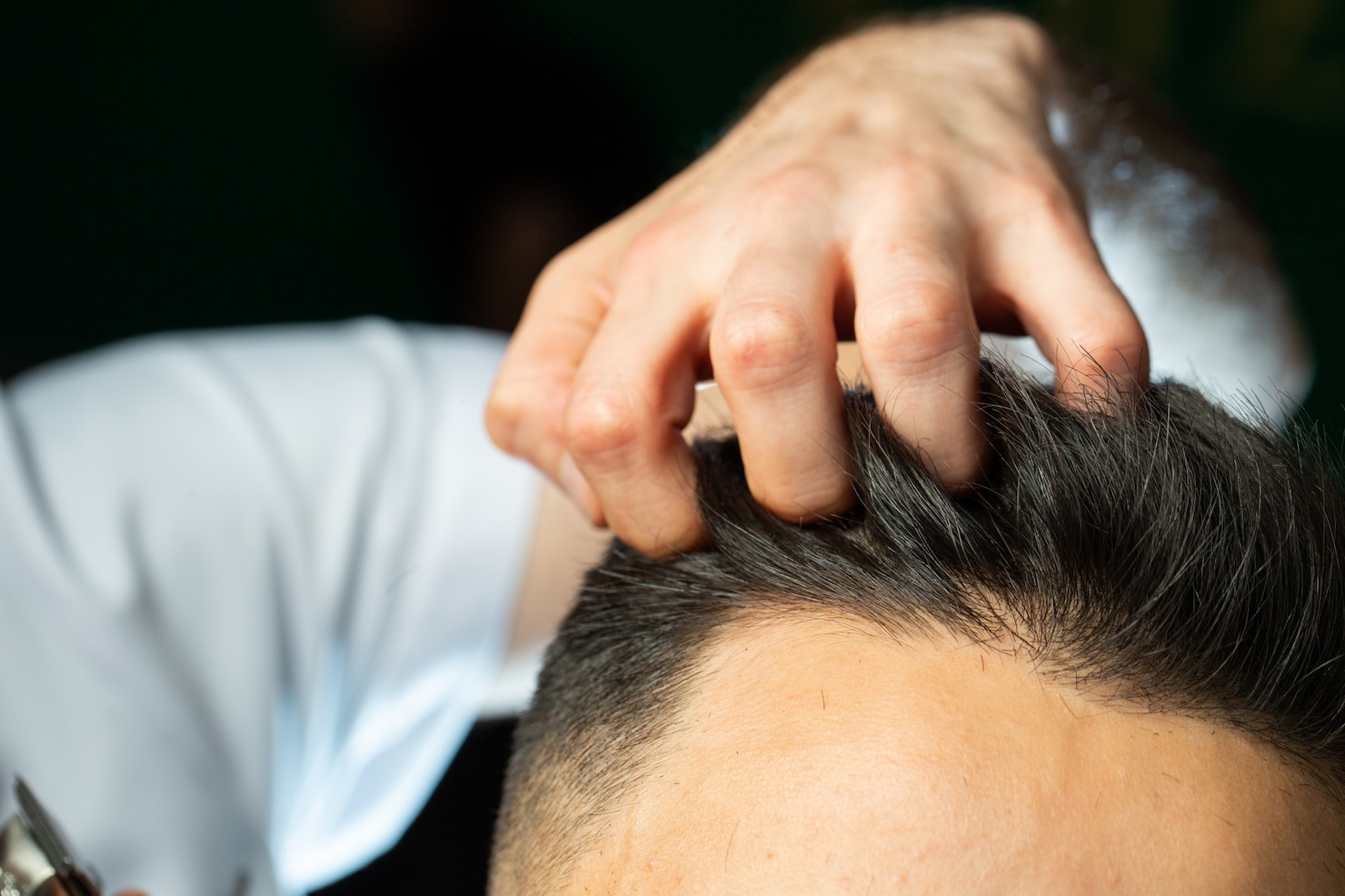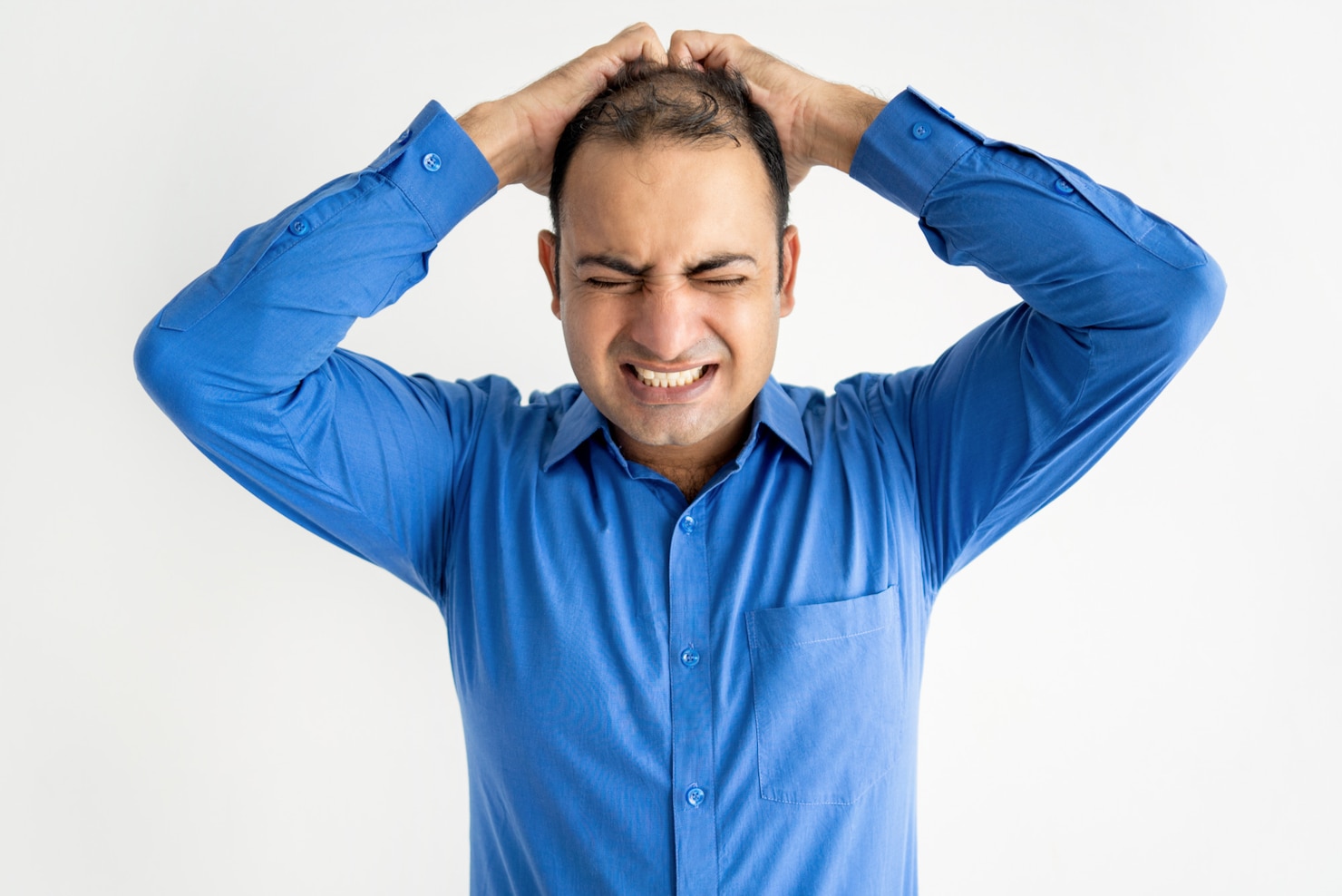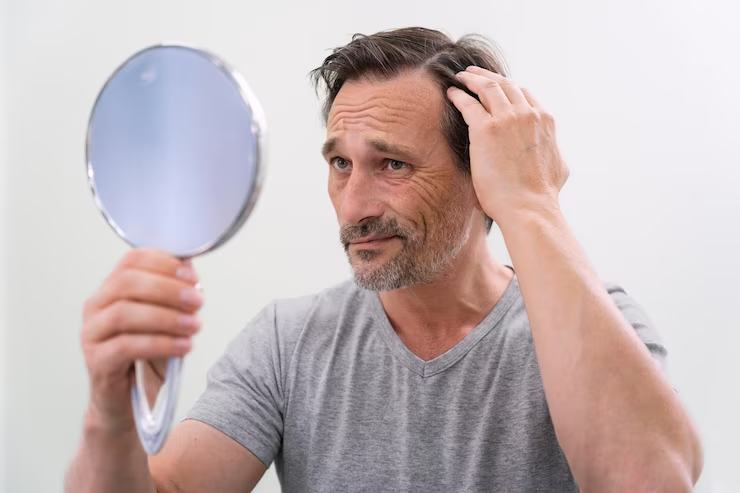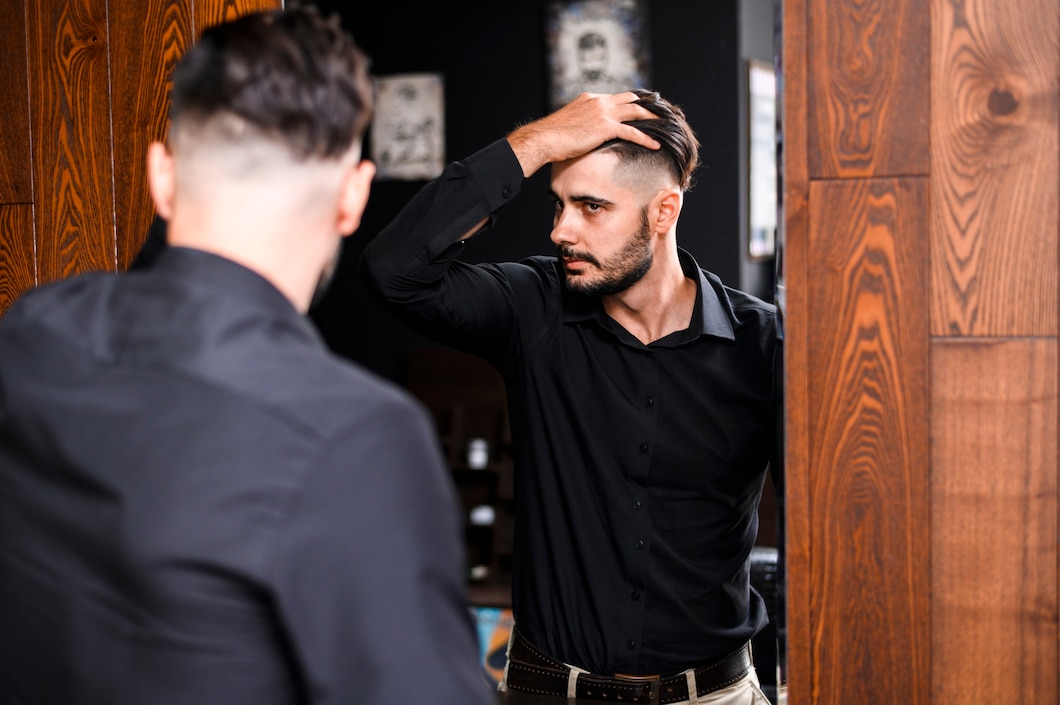
If you have an itchy oily scalp, you know how uncomfortable and frustrating it can be. It can cause embarrassment and make you self-conscious, leading to a lack of confidence. You’ve likely even endlessly searched for terms like “itchy scalp men,” “men's itchy scalp,” and “men's shampoo for dry itchy scalp” just to find a solution.
Luckily, there are several simple solutions that you can try to relieve your symptoms and improve your scalp health. In this blog, we will explore the causes of itchy oily scalp and provide you with effective solutions to prevent and treat it.
Understanding the Causes of Itchy Oily Scalp
If you're dealing with an itchy oily scalp, it's essential to know what's causing it. An itchy oily scalp is a condition characterized by excessive oil production and itchiness in the scalp area. It is often caused by various factors that can trigger the sebaceous glands to overproduce oil.
What is an Itchy Oily Scalp?
An itchy oily scalp is a condition that affects many people, and it can be uncomfortable and embarrassing. An itchy scalp often leads to scratching, which can cause irritation and even infections. The excess oil production can cause your hair to look greasy and dirty, even if you wash it regularly.
What Causes an Itchy Oily Scalp?
There are several causes of an itchy oily scalp, including hormonal imbalances, genetics, stress, and poor hair hygiene. Hormonal imbalances, especially during puberty and menopause, can trigger the sebaceous glands to produce more oil. Genetics can also play a role in the development of an oily scalp, as some people are more prone to it than others.
Stress can also trigger an itchy oily scalp, as it can affect the hormonal balance in the body, leading to increased oil production. Poor hair hygiene, such as not washing your hair regularly or using harsh hair products, can also contribute to an itchy oily scalp.
Key Takeaway:
An itchy oily scalp is a condition characterized by excessive oil production and itchiness in the scalp area. It can be caused by various factors, including hormonal imbalances, genetics, stress, and poor hair hygiene. Understanding the causes of an itchy or oily scalp can help you identify the triggers and take steps to prevent or treat the condition.How to Prevent Itchy Oily Scalp
If you're struggling with an itchy oily scalp, you're not alone. However, there are some simple habits you can adopt to help prevent this common issue.
Proper Hair Care Habits for Men
Proper hair care is key to preventing an itchy oily scalp, and it all starts with finding the right shampoo and conditioner. Look for products that are specifically designed for oily hair types, and make sure to rinse your hair thoroughly to remove any product buildup. Oily hair-friendly products often contain ingredients such as gentle yet potent cleansers like salicylic acid or tea tree oil, which help remove excess sebum and residue, while also soothing and purifying the scalp.
Additionally, avoid using hot water when washing your hair, as it can strip your scalp of its natural oils and lead to dryness and irritation. Another key habit to adopt is to avoid using hair styling products that contain harsh chemicals. One commonly known chemical to avoid is sulfates, such as sodium lauryl sulfate (SLS) and sodium laureth sulfate (SLES). These aggressive surfactants can strip the hair of its natural oils, leading to dryness, frizz, and potential scalp irritation.
Another chemical to watch out for is parabens, which are preservatives often found in hair products. Parabens have been linked to hormonal disruptions and skin sensitivities. Additionally, products containing alcohol, particularly high concentrations of denatured alcohol, can be drying and damaging to the hair, resulting in brittleness and breakage.
The Role of Diet and Lifestyle in Preventing Itchy Oily Scalp
Your diet and lifestyle habits can also play a significant role in preventing an itchy oily scalp. To reduce excess oil production, make sure to eat a balanced diet that is rich in healthy fats, such as omega-3 fatty acids, and low in processed and sugary foods. Drinking plenty of water can also help flush out toxins from your body and keep your scalp healthy.
Additionally, stress can contribute to an oily scalp, so it's important to manage your stress levels. Exercise regularly, practice relaxation techniques such as meditation or yoga, and make time for hobbies that you enjoy.
Key Takeaway:
Adopting proper hair care habits and making healthy lifestyle choices, such as eating a balanced diet and managing stress, can help prevent an itchy oily scalp.Natural Ingredients for Itchy Oily Scalp Relief
If you're dealing with an itchy oily scalp, you may want to consider using natural remedies to alleviate the discomfort. Not only are they affordable and easily accessible, but they can also be effective in improving your scalp health.
Essential Oils for Scalp Health
Essential oils have been used for centuries for their medicinal properties, and they can also be effective in promoting a healthy scalp. Tea tree oil, for example, has antifungal and antibacterial properties that can help combat the buildup of oil and bacteria on the scalp. Peppermint oil can also be helpful in soothing an itchy scalp and regulating sebum production.
Other essential oils such as lavender and rosemary can promote hair growth and improve the overall health of your scalp.
Herbs and Other Natural Remedies for Itchy Oily Scalp
Herbs such as chamomile, aloe vera, and witch hazel can also be beneficial in alleviating the symptoms of an itchy oily scalp. Chamomile has anti-inflammatory properties that can help reduce redness and irritation on the scalp.
Aloe vera, on the other hand, can soothe and moisturize the scalp, while witch hazel can help control oil production and remove excess oil and impurities from the scalp. Apple cider vinegar is another natural remedy that can help balance the pH levels of your scalp and remove buildup, which can contribute to itchiness.
By incorporating natural ingredients such as essential oils and herbs into your hair care routine, you can provide relief for your itchy oily scalp without resorting to harsh chemicals. However, it is important to note that natural remedies may not work for everyone, and you should always consult with a healthcare professional before trying any new products or treatments.
Key Takeaway:
Essential oils, herbs, and other natural remedies can be effective in providing relief for an itchy oily scalp. Tea tree oil, peppermint oil, chamomile, aloe vera, witch hazel, and apple cider vinegar are just a few examples of natural ingredients that can help promote scalp health.Over-the-Counter Treatments for Itchy Oily Scalp

Image Source: FreePik
If you’re looking for a quick fix for your itchy, oily scalp, you may want to try some over-the-counter treatments. Two of the most common types of over-the-counter treatments are shampoos and medicated treatments.
Shampoos and Conditioners for Oily Scalp
Many shampoos and conditioners are designed to help with oily hair and scalp. These products are specially formulated to remove excess oil and dirt from your hair and scalp, leaving it feeling clean and refreshed. Look for shampoos and conditioners that contain ingredients such as salicylic acid, tea tree oil, or sulfur, which can help to control oil production and reduce inflammation.
Be sure to follow the instructions on the bottle and use the products as directed. Overuse of these products can cause your scalp to become dry and irritated.
Medicated Treatments for Itchy Oily Scalp
If you have a more severe case of itchy, oily scalp, you may need to use a medicated treatment. These products contain active ingredients such as coal tar, ketoconazole, or selenium sulfide, which can help to reduce inflammation and itching.
Some medicated treatments may also help to slow down oil production on your scalp. Be sure to read the label carefully and follow the instructions. These products can be harsh and may cause side effects such as dryness, redness, and irritation.
Over-the-counter treatments can be an effective way to treat itchy, oily scalps. Shampoos and conditioners designed for oily hair and scalp can help to remove excess oil and dirt, while medicated treatments can provide relief for more severe cases. Be sure to read the label carefully and use the products as directed to avoid irritation and other side effects.
Key Takeaway:
Over-the-counter treatments such as shampoos and medicated treatments can be an effective way to treat itchy, oily scalp. Look for ingredients such as salicylic acid, tea tree oil, or sulfur in shampoos and conditioners, and active ingredients such as coal tar, ketoconazole, or selenium sulfide in medicated treatments.Prescription Options for Itchy Oily Scalp

Image Source: FreePik
When it comes to severe cases of itchy oily scalp, over-the-counter treatments may not be enough. This is where prescription options come in.
When to See a Doctor for Itchy Oily Scalp
If your itchy oily scalp persists despite the use of over-the-counter treatments, it may be time to consult a doctor. You should also see a doctor if you experience other symptoms such as redness, swelling, or bleeding on your scalp. In some cases, itchy oily scalp can be a symptom of an underlying condition such as psoriasis or seborrheic dermatitis.
Prescription Options for Severe Cases
Your doctor may prescribe a medicated shampoo or topical treatment containing ingredients such as ketoconazole, selenium sulfide, or coal tar. These ingredients work by reducing the production of oil on the scalp and preventing the growth of fungi or bacteria that can contribute to itching and inflammation.
For more severe cases, your doctor may also prescribe an oral medication such as isotretinoin or a steroid. These medications work by reducing the production of oil on the scalp and reducing inflammation.
It is important to follow your doctor's instructions when using prescription options for itchy oily scalp. Some prescription medications can have side effects or interact with other medications you may be taking.
Key Takeaway:
If your itchy oily scalp persists despite the use of over-the-counter treatments, it may be time to consult a doctor. Prescription options for severe cases may include medicated shampoos, topical treatments, oral medication, or steroids. It is important to follow your doctor's instructions when using prescription options.Frequently Asked Questions About Itchy Oily Scalp
If you're experiencing an itchy oily scalp, you may have a few questions about what's causing it and how to treat it. Here are some answers to common questions that you may have.
What are the Symptoms of Itchy Oily Scalp?
If you have an itchy oily scalp, you may experience symptoms such as:
Itchiness and irritation on your scalp
Oily hair that looks greasy and flat
Dandruff or flaking on your scalp
Redness or inflammation on your scalp
Sensitive skin on your scalp
If you're experiencing any of these symptoms, it's important to address the issue as soon as possible to avoid any further complications.
Can Stress Cause Itchy Oily Scalp?
Stress can be a contributing factor to an itchy oily scalp. When you're stressed, your body produces more cortisol, which can increase oil production on your scalp. This can lead to oily hair and scalp, which in turn can cause itching and irritation.
In addition to stress, other factors that can contribute to an itchy oily scalp include hormonal changes, genetics, and certain medical conditions such as seborrheic dermatitis and psoriasis.
What Are Some Effective Treatments for Itchy Oily Scalp?
There are several treatments that can help alleviate the symptoms of an itchy oily scalp. These include:
Using a gentle, pH-balanced shampoo
Avoiding hot water when washing your hair
Applying a scalp mask or treatment to help reduce oil production
Using an anti-dandruff shampoo if you have flaking or dandruff
Seeing a dermatologist if your symptoms are severe or persistent
By following these tips and seeking medical attention if necessary, you can help relieve the symptoms of itchy oily scalp and promote healthier hair and scalp.
Key Takeaway:
Itchy oily scalp can be uncomfortable and frustrating, but there are several effective treatments that can help alleviate symptoms. By using gentle hair products and seeking medical attention if necessary, you can improve the health of your scalp and hair.Conclusion
In conclusion, an itchy oily scalp can be uncomfortable and frustrating. Understanding the causes and implementing simple habits like proper hair care, a healthy diet, and lifestyle choices can help prevent and treat the condition. Natural remedies such as essential oils, chamomile, aloe vera, and witch hazel can be effective in alleviating the symptoms of an itchy oily scalp.
With these solutions, you can relieve your symptoms, improve your scalp health, and restore your confidence.


